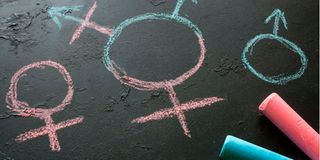‘My name is female but I look male’: Pain of being intersex

Due to stigma, it is very hard for intersex persons to ‘come out’.
Boniface Nyaberi, 26, is a distraught man, who is in search of identity.
Nyaberi who comes from Marani in Kisii County was born a female and was named Vyone Moraa, but later in his life during his adolescence, he felt more like a male and chose to identify as a man.
Though Nyaberi’s voice is still female, some of his body morphology portray a predominantly male physique and he gets irritated when unwittingly addressed as a girl.
Nyaberi is among dozens of people in Kisii who are born intersex. He vows to never marry and is not even interested in engaging in any romantic relationship.
“I just don’t want to ever marry and I have not been in any relationship. This is a personal decision and I just want to stay that way. I don’t want to be traumatised anymore,” said Nyaberi, who is an orphan.
Nyaberi, the fourth born in a family of four laments that discrimination and stigmatisation are the major challenges he faces in his life because many Kenyans have little understanding of intersex persons.
He says sometime last year, he went public about his situation and was covered by local vernacular television stations in Kisii.
“When I went back home, people mocked and laughed at me. They called me all manner of expletives including a derogatory insult in Ekegusii against an uncircumcised girl,” lamented Nyaberi.
He added that on many occasions, he has been told that he is not a human being and is not even fit to talk in front of people.

Boniface Nyaberi who is an intersex person. Though Nyaberi’s voice is still female, some of his body morphology portray a predominantly male physique and he gets irritated when unwittingly addressed as a girl.
Maryline Omwenga, 23, is a student in one of the colleges in Kisii town. Omwenga says life in school is a living nightmare because even going to the toilet attracts humiliating actions with some students gleefully laughing at her.
“I do not go to the washrooms in school anymore because my name itself is female but I look male. Those other students wonder why I have a female name yet I’m a boy. The few times I have gone, they followed me to see what I was doing,” said Omwenga.
Just like Nyaberi, Omwenga says their main challenge is discrimination and stigmatisation, over something they have no control over.
“I was born female but I now appear a male. But still, I cannot say I’m male because I don’t have male organs. Some people think intersex is having two sexual organs, which is not the case. At times it’s just hormonal. If you look at me, I don’t have any visible male features, but I feel male because the dominant hormones are those of a man,” says Omwenga who hails from Chepilat in Borabu.
Nation.Africa caught up with Nyaberi and Omwenga at St Vincent Pastoral Centre in Kisii town on Tuesday, during a public participation forum where the Draft Intersex Persons Bill, 2023, was being discussed.

Maryline Omwenga who is an intersex person. Omwenga says life in school is a living nightmare because even going to the toilet attracts humiliating actions with some students gleefully laughing at her.
Intersex Persons Bill
They hope that the Bill, if passed, will help address challenges facing intersex individuals and have their rights entrenched in the statutes.
Intersex Persons Bill, 2023 aims at having an Act of Parliament to provide for the recognition, protection and safeguarding of intersex person’s human rights in Kenya; to provide for the equalization of opportunities, affirmative action and non-discrimination of intersex persons, and for connected purposes.
According to the Draft Bill, an Intersex person means a child or an adult with a congenital condition in which the biological sex characteristics cannot be exclusively categorised in the common binary of female or male due to inherent and mixed anatomical, hormonal, gonadal, or chromosomal patterns, which could be apparent prior to, at birth, in childhood, puberty or adulthood.
The Kenya National Commission on Human Rights (KNCHR), one of the organizations at the forefront of advocating for the rights of intersex persons. organised a two-day public participation forum for Kisii residents to discuss the Draft Bill.
KNCHR Chief Executive Officer (CEO) Bernard Mogesa said they are subjecting a Bill that will protect the rights of intersex persons in Kenya.
“The Commission has been working with stakeholders and there is now a Draft Bill which is being subjected to public participation in Kisii and in other 24 counties this week in the Republic of Kenya. We are gathering information and input from the members of the public and other stakeholders so that we can polish up this Bill. The other process of enacting it into law will follow thereafter,” said Dr Mogesa.
He added, “The Commission has done a lot in terms of promotion and protection of the rights of intersex persons. But it found it very important to work with various stakeholders including government bodies like the Office of the Attorney General among others, to come up with the law that will ensure we protect the rights of intersex persons within a framework.”
He said so far, the Kenya Institute of Curriculum Development is picking the issue of intersex persons and that the Commission will provide the technical expertise on the rights of intersex persons to ensure we have the right content.
The KNCHR CEO said many intersex persons are still hiding and called on them to come out for help.
He noted that in the 2019 Census, only 1, 524 intersex persons were recorded in the country while Kisii reported 38.
“We believe many did not come out to be counted. But our Commission which has a branch in Kisumu is here to assist you,” pleaded Dr Mogesa.





